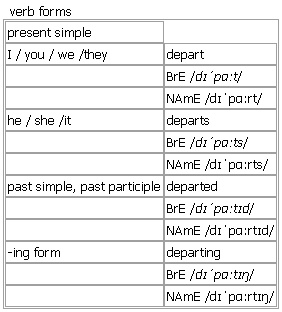|
Tل»« ؤ‘iل»ƒn Oxford Advanced Learner 8th
 depart
depart

deآ·part [depart departs departed departing] BrE [dةھثˆpة‘ثگt] NAmE [dةھثˆpة‘ثگrt] verb (rather formal)
1. intransitive, transitive to leave a place, especially to start a trip
Opp: ↑arrive
•~ (for…) (from…) Flights for Rome depart from Terminal 3.
•She waited until the last of the guests had departed.
•~ sth (NAmE)The train departed Amritsar at 6.15 p.m.
2. intransitive, transitive (NAmE)to leave your job
•the departing president
•~ sth He departed his job December 16.
see also ↑departure
Idiom: ↑depart this life
Derived: ↑depart from something
Verbآ forms: 
Wordآ Origin:
Middle English: from Old French departir, based on Latin dispertire â€کto divide’. The original sense was â€کseparate’, also â€کtake leave of each other’, hence â€کgo away’.
Exampleآ Bank:
•He departs for New York tomorrow morning.
•The plane was scheduled to depart at 8.30.
•The plane was scheduled to depart later that day.
•They shook hands all round and prepared to depart.
•We depart from Heathrow at ten o'clock tonight.
•Flights for Amsterdam depart from Terminal 3.
•Giving a large pay-off to a departing executive may be seen as rewarding failure.
•He departed the troubled firm after less than a year in the post.
•Most of the tourists had departed the area.
•The train departs Amritsar at 4.20 p.m.
•This train will depart in three minutes.
•You must depart for England immediately.
|
|
|
▼ Từ liأھn quan / Related words
Related search result for "depart"
|
|
